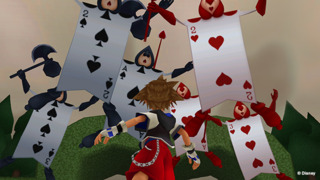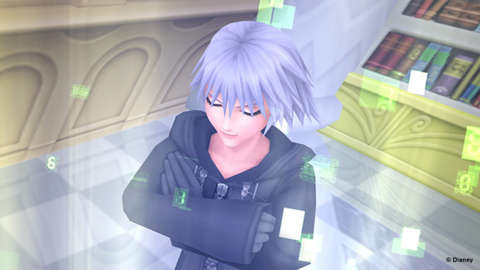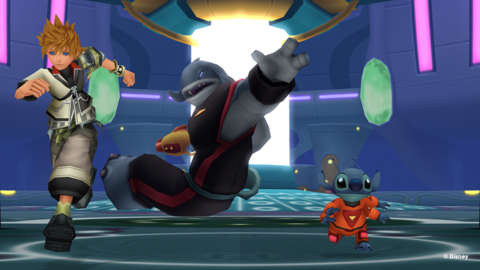Early in the Kingdom Hearts 2.5 storyline, Sora, an idealistic boy rocketing out of childhood and into adolescence, says goodbye to a group of potential new friends as he waits to board a train that will shoot him off to the stars and into a grand new adventure. And although he's just met these ragtag teens who are dreading the end of their summer vacation and trying to score their next batch of sea salt ice cream, a single tear rolls down Sora's cheek as he waves farewell.
The moment shouldn't work. Its power rests on delving into the depths of a comically complex conspiracy tale involving metaphysical doppelgangers, simulated realities, and hyperbolic teen angst. But, the moment does work. In fact, the romantic, sincere innocence of Kingdom Hearts still carries an emotional punch, powerful on its own merits and just as affecting today as it was at its genesis.

Kingdom Hearts HD 2.5 Remix is a relic of childhood and early teenage blossoming for the many of us who came of age in the early- to mid-2000s. With a disc that contains Kingdom Hearts II (a 2005 PS2 game) and Kingdom Hearts: Birth by Sleep (a 2010 PSP game) as well as Kingdom Hearts Re:Coded (a collection of the cutscenes from the 2008 mobile game), Remix is a nostalgic mix of storytelling and personality that stands tall nearly a decade after the oldest game's release. Built on the back of versatile combat, endearing characters, and enchanting forays into the Disney films, it's a shame that competent and enthralling plotting is so far out of reach for the main stories of any of the games.
After defeating the Heartless with the help of his friends Donald and Goofy at the end of Kingdom Hearts, Sora embarks on a quest to return home to his beloved Destiny Islands with his best friends Kairi and Riku. At the same time, he is dealing with the emergent threat of new soulless abominations known as Nobodies, who are doing the work of the mysterious cabal called Organization XIII. Sora and his friends travel from one Disney-themed world to the next (including Agrabah, the jungles of The Lion King, Halloween Town, and even the world of Pirates of the Caribbean) as he investigates the destruction wreaked by the Nobodies and tries to find his friends. Along the way, Sora learns a lesson or two about friendship, sacrifice, and growing up.
The romantic, sincere innocence of the Kingdom Hearts franchise still carries an emotional punch, powerful on its own merits.

Unlike the first game, where the Disney elements existed primarily to serve the overarching story, Kingdom Hearts II falters by doing the reverse. The trips to Disney-themed worlds--which are the raison d'etre for the whole series--are mostly highly compressed, theme park versions of Disney films without the space for characters to breathe and grow as they do in the movies. And, more often than not, these levels have only the slightest bearing on the intentions or nature of Organization XIII, its relationship to Roxas, the boy whom you spend the first three hours of the game playing as, or the identity of the cowled DiZ. And while the strength of the source material (the emotional heft of Beauty and the Beast or the subversive strangeness of The Nightmare Before Christmas) carries you through most of these worlds, many feel like fun padding, particularly in the "return to everywhere you've already been" back half. Throw in a story that is too byzantine for children to follow and too impersonal for adults to invest themselves in, and Kingdom Hearts II lacks the guilty-pleasure fun narrative of the first game.
And that's a pity, because despite itself, Kingdom Hearts II delivers enough moments of simple but piercing emotion to fill any game of its length. Towards the end of his adventure, Sora returns to the Hundred Acre Woods to say goodbye to the corpulent, half-dressed bear, Winnie the Pooh. Winnie had forgotten their friendship as well as his friendships with the nervous Piglet, hyperactive Tigger, and neurotic Rabbit. But through the bonds of caring and friendship, Pooh's memories return and as Sora prepares to leave, Pooh wishes for a way to make Sora stay and remain his friend. Sora promises the disappointed bear that he'll return, but Sora will always remain in his heart and memories.
It's a tired trope of children's storytelling, but its delivery feels authentic, evoking memories of being a child and saying goodbye to friends who move away. And, unlike the bombastic main plot, it doesn't wave its arms around, drawing attention to itself. There are games being released today with aesthetics or mechanics meant to appeal to children, but other than Ni No Kuni, it's rare for a game to evoke what it feels like to be a child. But in the moment with Pooh, the goodbye in the train station, long-awaited reunions, and shocking farewells, Kingdom Hearts radiates the purity and heart that is its redemption.
It's a shame that competent and enthralling plotting is so far out of reach for the main stories.

A sizeable improvement over the first game, Kingdom Heart II's combat is elegant while also offering a suite of ways for you to customize your style. Real-time combat sees you attacking, blocking, jumping, and activating special reaction commands. But with a host of equippable spells and a socketed ability system akin to Final Fantasy IX, you can outfit Sora with ways to boost his speed, magic, and strength to your liking and equip Donald, Goofy, and Disney heroes including Mulan, Hercules, Simba, and the Beast to complement your style of play. Combat may boil down to mashing the attack button while occasionally blocking or dodging, but the screen explodes with flashy effects to make every strike of the keyblade carry weight and pop. And although it clearly reaches out to the kid in all of us, Kingdom Hearts II can be unforgivingly difficult; on a handful of occasions, the game reaches a brutal Dark Souls level of difficulty.
Beyond the transition to HD, Square Enix has touched up many of the visual elements of the game. And in the worlds/areas that are the most stylized, abstract, and exaggerated, Kingdom Hearts II manages to look as good as many games on the current market. Whether it's the gothic interiors of the Beast's castle, the clean geometric cyberpunk lines of the world of Tron, or a free running course on the pages of the Winnie the Pooh book itself, the game shows off a vibrant art design whose expert use of color and cartoon style invites the imagination to lose itself in this world. On the other hand, areas that weren't touched up or draw attention to their low polygon count and muddy textures look even uglier in comparison.
The game also supplies hours and hours of extra content for you to dive into. The first game’s Olympus Coliseum arena battles return with a dark, Hades-themed spin. Emblems are scattered on nearly every world, inviting you to tackle extra-difficult versions of Organization XIII foes. Hidden puzzle pieces can be found in the hard-to-reach corners of the worlds, leading into a simple but rewarding jigsaw puzzle mini-game. It's fun to watch your pictures slowly come into focus with each trip to each new world. And Gummi Ship battles have been completely revamped as gorgeous and difficult to master on-rails shooter sections, another major improvement over the first game.
The screen explodes with flashy effects to make every strike of the keyblade carry weight and pop.


Birth by Sleep is the more consistently fun game on the disc, although it lacks any of those moments of unexpected emotional power that Kingdom Hearts II is able to achieve. A prequel to the first game, Birth by Sleep follows three young students of a Keyblade master as they investigate invasions by beings called the Unversed into worlds that have yet to experience Heartless or Nobodies. Each character has an individual story which is played to completion, at which point you can choose to finish the journey of one of the others.
Lead characters Terra, Aqua, and Ventus lack the charms of Sora, Donald, and Goofy, although Ventus comes the closest of any of them to bringing back that playful joy. Terra becomes a painfully cliche troubled, navel-gazing teenage JRPG protagonist and Aqua's arc is purely reactive to the actions of Terra and Ventus. Ventus, at least, smiles and acts like he's actually his character's age. And the story itself is focused, with only a few trivial excursions just for Disney's sake, although by the end it mostly serves to set up the events of the first two main games.
What makes Birth by Sleep stand out is its combat system. Without sacrificing the simple controls of Kingdom Hearts II's combat, Birth by Sleep ups the number of ways you can control your character. By removing a hotbar for spells and locking every ability to a single button, it makes it easy to switch equipped abilities on the fly rather than struggling through menus in real time. The abilities that are equipped can be leveled up and fused with other leveled up abilities to create new powers. Equipped abilities can be employed in general orders to activate powerful finish command styles;between deciding which abilities to equip/make and choosing which command styles to deploy, you never feel forced into one specific style of play.

While neither game will win awards for its narrative, playing both and adjusting your play style to whichever task you have at hand is always a blast. Re:Coded is the only true bust on the disc, a collection of re-tooled cutscenes, and for two of the three hours that you sit through the game, it's difficult to name a reason to justify its existence. It begins as a glitched out sci-fi simulation of the events of the first game, and although it does evolve past that, sitting through it is a chore even for those most dedicated to the Kingdom Hearts lore. Still, with dozens of hours of either of the other two games, it's hard to be too upset.
The last ten years have taken a toll on this franchise, and it's easy to fear that Kingdom Hearts III will fall prey to the unnecessary mental gymnastics Kingdom Hearts II required, but those last ten years have also made it easier to appreciate how warm and inviting these games are. You don't shoot assault rifles. You don't hack people's phones. You don't cause destruction and mayhem. You yearn for ice cream. You push yourself to the ends of the Earth to find your friends. You learn and grow and mature. And, to paraphrase Alan Menken and Tim Rice, you see whole new worlds before you're done.